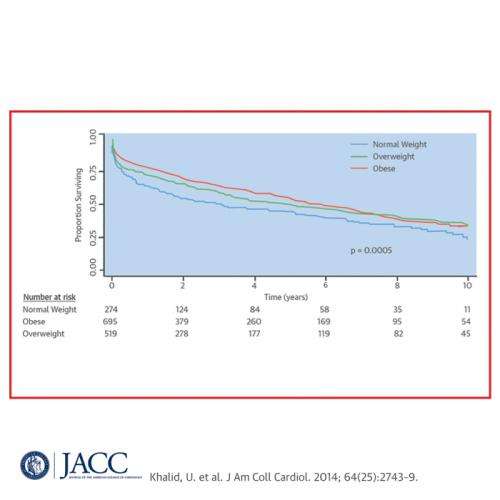Survival rates higher in obese heart failure patients

Patients who were obese before developing heart failure lived longer than normal weight patients with the same condition according to a new study in the Journal of the American College of Cardiology that examined the "obesity paradox" by following obese and non-obese heart failure patients for more than a decade.
Using data from the Atherosclerosis Risk in Communities Study, researchers looked at body mass index before the initial diagnosis of heart failure in 1,487 patients and followed them for 10 years, comparing the survival rates of obese, overweight and normal weight patients after the development of heart failure. The majority of patients included in the study were overweight (35 percent) or obese (47 percent) prior to their initial diagnosis of heart failure.
During the 10 year follow-up period, 43 percent of the patients in the study group died, but the overweight and obese patients had better survival rates compared to the normal weight patients. Over the decade of follow-up, 38 percent of obese and 45 percent of overweight patients died compared to 51 percent of normal weight patients. Obese and overweight patients were more likely at the outset to have other health issues, including hypertension and diabetes.
This is the first study to demonstrate that higher BMI before heart failure diagnosis is independently associated with better survival outcomes after the development of heart failure, over a long follow-up period. Previous studies have shown that although obesity is an independent risk factor for the development of heart failure, higher body mass index, as measured in patients with established heart failure, is associated with improved survival.
The study's findings could suggest that obese patients have a higher metabolic reserve than the normal BMI patients, perhaps providing a survival advantage when spontaneous weight loss due to heart failure occurs, or that obese heart failure patients manifest symptoms of heart failure earlier in the disease process, the authors said.
"Most patients with heart failure have pre-existing overweight or obesity, yet they have lower mortality compared to normal body mass index heart failure patients," said the study's senior author, Anita Deswal, M.D., of the Michael E. DeBakey V.A. Medical Center and Baylor College of Medicine in Houston. "Our findings suggest that a major component of the so-called obesity paradox is premorbid obesity and it's unlikely that spontaneous weight loss due to advanced heart failure is the only contributing factor to the obesity paradox."
In an accompanying editorial, Thomas J. Wang, M.D., of Vanderbilt University Medical Center, said the study demonstrates the best evidence to date that the obesity paradox is not simply due to extreme weight loss in late-stage heart failure and drives home the need for a better understanding of what causes the obesity paradox. "Ultimately, a better mechanistic understanding of what drives the obesity paradox should serve as the basis for postulating whether an 'optimal' BMI exists for heart failure patients and whether interventions are warranted to maintain or achieve this BMI."

















